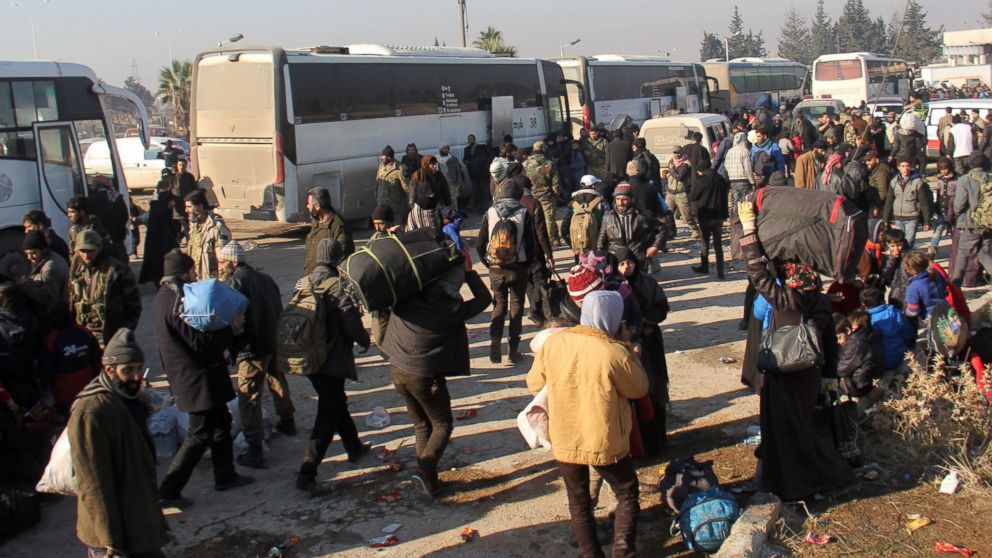Thousands Evacuated From Aleppo as UN Votes to Monitor the Area
— -- Buses drove thousands of residents out of the last rebel-held enclave of eastern Aleppo today as the United Nations Security Council unanimously voted to monitor the evacuations, which resumed after a breakdown.
About 7,000 people have been bused out of the besieged area to the western countryside since Sunday night, according to the International Committee of the Red Cross in Syria.
Earlier today, the Syrian Observatory for Human Rights said that close to 14,000 people, including more than 4,000 fighters, have left rebel-held Aleppo since Thursday.
At the same time, convoys of 500 evacuees, including sick civilians and orphans, left Foua and Kefraya, two pro-government Shiite villages surrounded by opposition forces, the Observatory and the ICRC said. More buses are expected to arrive in the two villages to continue evacuations throughout the day.
The evacuations are part of a deal between rebels and the Syrian government and its allies to allow thousands of civilians and fighters trapped in eastern Aleppo to leave the area, under the condition that about 4,000 civilians, including the wounded in Foua and Kefraya, are evacuated as well. Also according to the deal, 1,500 civilians are to be evacuated from the Syrian town of Madaya, a rebel stronghold.
The U.N. Security Council met in New York today and voted unanimously for a resolution urging the immediate deployment of U.N. observers to former rebel-held eastern Aleppo — which France says is crucial to preventing "mass atrocities" by Syrian forces and militias.
U.N. Secretary General Ban Ki-moon said Friday that Aleppo is now a "synonym for hell."
"We have collectively failed the people of Syria," he said. "Peace will only prevail when it is accompanied by compassion, justice and accountability for the abominable crimes we have seen."
Jan Egeland, the chairman of the United Nations Humanitarian Access Task Force in Syria, tweeted that evacuations were "in full swing" today.
Among the thousands of evacuees were 47 children, some critically sick and injured. They were rescued from an orphanage in eastern Aleppo, UNICEF said.
On Sunday, armed men set fire to buses en route to pick up civilians from Foua and Kefraya, according to Egeland and the Syrian Observatory for Human Rights. The Observatory said it believed that members of the Qaeda-affiliated Jabhat Fath al-Sham, formerly the Nusra Front, attacked the buses. A video shows burning buses near men shouting "God is greatest" and taking responsibility for the attacks.
In a statement in Arabic, the Free Syrian Army, an armed opposition group, condemned the attack on the buses, saying it was a crime against the Syrian revolution that "endangers the lives of about 50,000 besieged people."
Long-awaited evacuations from eastern Aleppo began Thursday, but the process broke down the next day. Syrian state TV accused rebels of firing on a convoy of evacuees at a checkpoint, while anti-government activists said pro-government militias blocked the passage.
"I tried [to leave], but we got blocked by Iranian and sectarian militias who stopped us," Monther Etaky, an eastern Aleppo anti-government activist, told ABC News Saturday after attempting to leave Friday. "They blocked the previous convoy, and we were just waiting for a long time. In the end, we received an order to return because the agreement had been canceled. We heard gunfire, and then people started running, and we went back."
Civilians, including the wounded, have reportedly been waiting for days to be evacuated from eastern Aleppo. Activists say some of the injured have died while waiting to be taken out of besieged part of the city.
Before the war, Aleppo was Syria’s largest city, with a population of 2 million. The city had been divided into the rebel-held east and the government-held west since 2012. In recent months, the Syrian government, with help from Russia, Iran and other allies, intensified airstrikes on eastern Aleppo and tightened the siege in an attempt to gain full control of the area, which was rebel controlled until recently. Gaining control of the eastern neighborhoods is a strategic victory for Syrian President Bashar al-Assad.




